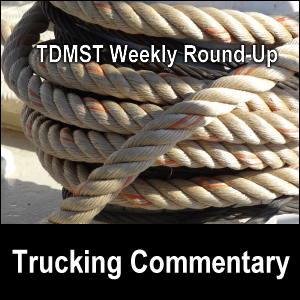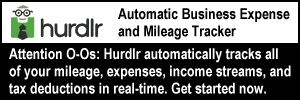This is the TDMST Weekly Round-Up of news affecting professional truck drivers, written by Vicki Simons for the week ending September 28, 2019.
We welcome your comments, thoughts and feedback on the items of your choice below.

1. Regarding California smog law:
According to a September 24, 2019, article:
“Truckers will have to have their rigs smog-checked and certified in order to operate legally in California under a bill signed into law by the state’s governor, Gavin Newsom.”
The article here stated:
Under the new “Clean Trucks, Clean Air” (SB210) law, after a two-year pilot is run to develop all the specifics, vehicle inspection and maintenance program for non-gasoline heavy-duty motor vehicles with GVW ratings above 14,000 pounds (Class 4 through 8) will be put in place to regularly measure the effectiveness of their emission controls to reduce the release of particulate matter and nitrous oxide (NOx) into the air.
Interestingly, “The new law applies to 18-wheelers, along with delivery trucks, dump trucks, tanker trucks, farm trucks and others. The law does not include buses.”
Other articles on this topic were written here and here.
Watch for the operation of commercial motor vehicles within the state of California to become more expensive because of this new law.
2. Regarding crash preventability and trucker scores:
“The FMCSA is going to remove ‘nonpreventable’ crashes from the SMS Crash Indicator BASIC, otherwise known as the Crash Indicator Behavior Analysis and Safety Improvement Category,” according to a September 23, 2019, article.
This can improve your score, but evidently, “your score can go up without you having a crash.”
Hmm…
If the nonpreventable crashes are removed from the scores of others, their improved scores will be pitted against yours.
Read the article for details.
3. Regarding marijuana, hemp and CBD:
Three articles published this week focused on marijuana, hemp and CBD:
- Why Can’t We Treat Marijuana Use Like Alcohol?
- What Truckers Need to Know About CBD Oils & Marijuana Laws (Video by OOIDA) with this embedded video
- Hauling hemp, though technically legal, still comes with risk — for now
4. Regarding artificial intelligence in trucking:
Of the “10 Ways Artificial Intelligence Will Improve the Trucking Industry,” at least two sound positive:
- regarding “preventative maintenance routines for vehicles to maximize the efficiency of the fleet”; and
- determination of “the optimal route and fleet mix required to … [maximize] … vehicle capacity [while] reducing fuel expenditure”.
However, one sounds frightening: ensuring that “self-driving vehicles operate correctly.”
Ouch!
Other than being hacked from the outside, what else would cause a self-driving truck to operate “incorrectly”?
Is this a foreboding indication of the problems that may ensue from relying too much on “artificial intelligence” instead of human intelligence?
5. Regarding trailer underride guards:
I made the following response to a posting of the article “Should Truck Trailers Have Side Underride Guards?” in a truckers group on Facebook:
The article said that the car driver “lost control of his car.”
Why should the entire trucking industry have to try to protect a very small minority of people who “lose control” on the roads?
Did anyone press for “why” the car driver lost control?
Hmm…
6. Regarding National Coffee Day:
Sunday, September 29 has been designated as “International Coffee Day 2019 in United States”.
Here’s where truckers can get :
- a free cup of coffee at “select TA, Petro Stopping Centers and TA Express locations“;
- a reduction in the cost of coffee at “Loves Travel Stops & Country Stores” on Sept. 29-30, “hot beverage sales [of which] will go to Love’s 20th annual Children’s Miracle Network Hospitals campaign”; and
- a free cup [to everyone] of what it humbly considers “the best coffee on the interstate” from Pilot Flying J.
7. Regarding recent truck crashes:
Early morning fatality
Although every truck accident makes us sad — especially those in which people die — my heart is especially grieved when a trucker from our own home state is killed.
A September 23, 2019, article states: “A truck driver from South Carolina died early Sunday, Sept. 22 when his tractor-trailer crashed into the back of a fire truck stopped at the scene of an earlier accident on Interstate 20 in Georgia west of Atlanta.”
One has to watch the video embedded on the news article page to find that the crash happened at around 3 a.m.
Every time I read about a truck accident that happened after dark — especially between, say, midnight and 6 a.m. — I wonder if the driver:
- was drowsy; or
- not working according to his/her circadian rhythm; or
- distracted; or
- over relying on the truck’s cruise control without being prepared to slow or stop.
Our condolences go to the trucker’s family.
Medical event
Despite having suffered a “medical event” — in this case, possibly a heart attack — a trucker who thereafter crashed into a house and then a gas station, “is likely facing a charge of failure to control”.
The article states, “According to Ohio law, failure to control is a fifth degree misdemeanor and is punishable by a fine of up to $150.”
It seems as though I’m reading more and more articles about truckers who are having “medical events” just before being involved in a crash.
What can be done to keep both of these kinds of accidents from happening?
8. Regarding trucks being booted:
We read from a September 23, 2019, article:
“A new law in Colorado calls for the regulation of private vehicle ‘booting’ companies in the state. … The booting provision in SB236 would cap fees associated with immobilizing vehicles.”
Mike Matousek, OOIDA manager of government affairs:
- “is encouraging the commission to clarify that the booting of an occupied motor vehicle or commercial motor vehicle is prohibited”; and
- said that “concern about excessive booting charges involving commercial motor vehicles are ‘prolific’ around the country,” with one report of an incident where an OOIDA member was given a “$3,000 booting invoice” in Charlotte, NC.
Ouch!
Be careful where you park your truck.
If you have had your truck immobilized — especially for a very large amount of money — please speak up!
9. Regarding smuggling:
Drugs
A September 23, 2019, article revealed that a Canadian trucker was arrested for “allegedly attempting to illegally smuggle over $6 million dollars worth of cocaine into Canada” across the Ambassador Bridge between Detroit, Michigan, USA, and Windsor, Ontario, Canada.
If the trucker had no knowledge of the drug on his truck, why did he show “extreme signs of nervousness” at customs?
People
We read news articles here and here about how the U.S. Border Patrol north of Laredo “uncovered a human smuggling attempt” to get 53 illegal aliens from 5 different countries across the border into the USA.
Although “the temperature inside the trailer was recorded at 105 degrees Fahrenheit”, none of the people inside required medical attention.
As of the time the article was written, the case was under investigation.
The drivers in both of these situations will likely face legal penalties, may lose their CDLs, and may have difficulty finding employment in the future.
It doesn’t matter how much the promised payoff is, smuggling drugs and illegal aliens doesn’t pay.
10. Regarding swerving to avoid an accident:
“A Pennsylvania truck driver perished early Monday morning when he lost control of his big rig after swerving to avoid a deer along I-88,” states a September 24, 2019, article.
Our condolences go to his family.
I have read numerous articles over the years of truckers who “swerved” to avoid what seemed like an impending accident, only to end up in an accident anyway.
In this case, not only did the trucker die, but the article said that he was “ejected” from the tractor, a word which usually refers to what happens to a driver involved in a crash who was not wearing his seatbelt.
According to information on the website of the National Highway Traffic Safety Administration:
Of the 37,133 people killed in motor vehicle crashes in 2017, 47% were not wearing seat belts. In 2017 alone, seat belts saved an estimated 14,955 lives and could have saved an additional 2,549 people if they had been wearing seat belts.
Furthermore, the NHTSA state, “Buckling up is the single most effective thing you can do to protect yourself in a crash”.
A word to the wise is sufficient.
11. Regarding minimum insurance bill:
“The Owner-Operator Independent Drivers Association is encouraging its members to contact their lawmakers in opposition of a bill that would increase motor carriers’ minimum insurance coverage to nearly $5 million,” according to a September 25, 2019, article.
12. Regarding bypassing scales when traffic is backed up:
“The California Highway Patrol (CHP) recently stirred up a social media firestorm with a Facebook post about the legality of bypassing a scale house when traffic is backed up,” according to a September 26, 2019, article.
Nearly 1,000 comments were made in less than 24 hours.
Some truckers are saying that they are willing to bypass the weigh station and risk getting a ticket rather than stop on the traveled part of the highway, thus decreasing highway safety and putting the lives of the motoring public at risk.
I have not yet read any articles about a rear-end accident caused by a trucker who — following the direction of law enforcement — stopped in a travel lane while waiting to go into a weigh station.
However, given the number of rear-end accidents that have happened in the last year or two, I think it may be only a matter of time before this happens at or near a weigh station.
Who will be held responsible in a situation like this?
The trucker, not the weigh station attendant, is the one who is in charge of the operation of his/her vehicle.
Period.
As a professional truck driver, this is one situation where you are going to have to evaluate your options carefully.
If you are a company driver, ask your trucking company what their official policy is regarding this situation — and if they are willing to pay the price of the ticket you receive for choosing to bypass a weigh station rather than risk an accident.
13. Regarding commercial motor vehicles and GPS use:
We read that “Iowa transportation officials are warning truck drivers of the consequences of trusting their GPS devices while looking for ways around an interstate closure.”
The article states that “Flooding in western Iowa has shut down portions of I-29 and I-680 over the past several days” and that truckers relying on GPS systems that have not kept them on truck routes have ended up getting stuck under low clearance bridges.
One helpful tip is: If you’re going into an area that is likely to be flooded, plan ahead to have a secondary truck route picked out.
Don’t put yourself into a no-win situation.
14. Congratulations!
We extend our heartiest congratulations go to:
- five truckers with Werner Enterprises for their million mile achievements; and
- seventeen truckers who were recognized “by the National Association of Small Trucking Companies” as members of their “Driver of the Year Team“.
Keep up the great work!
My husband Mike and I wish you — and all professional truck drivers — safe travels and lots of money saving opportunities on the road.
Return from TDMST Weekly Round-Up: 2019.09.28 to our TDMST Weekly Round-Up Trucking Commentary or our Truck Drivers Money Saving Tips home page.









